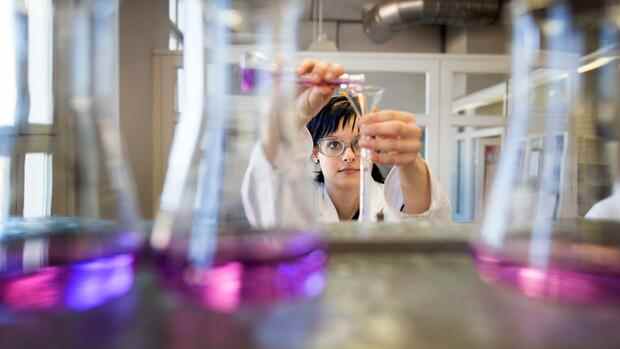Berlin The coalition agreement is like a cornucopia for education and research. Bettina Stark-Watzinger (FDP), the new Federal Minister for Education and Research, should not only directly support 8000 particularly needy schools across the country, but also bring the student loan back to its old size. A new agency that is supposed to accelerate the transfer of new scientific knowledge to companies is particularly important for the economy.
The Ministry of Education and Research will need billions of euros for this. “It will be expensive,” moan officials in the Ministry of Finance. The budget of the house would probably have to be increased by at least a quarter, i.e. around five billion euros, in order to realize the plans, calculate the negotiators.
So it is a good thing that Stark-Watzinger belongs to the party of the future finance minister and FDP leader Christian Lindner. The traffic light contract explicitly provides for significantly higher investments in education – Lindner has also repeatedly emphasized this. If the party leader should move away from it in the struggle for stable finances, he will be “gladly reminded”, announced the designated Secretary of State for Education Jens Brandenburg (FDP) as a precautionary measure.
The largest educational policy project is the new “Start Chances” program: 4,000 schools with a particularly large number of socially disadvantaged pupils are to receive a budget that they can use to build new buildings, modernize teaching or finance cooperation with outside actors. There are also permanent positions for social workers.
Top jobs of the day
Find the best jobs now and
be notified by email.
This means that around one in ten of the total of 40,000 general education schools and vocational schools in Germany would receive substantial support. Another 4,000 schools “in disadvantaged regions and neighborhoods” are also to be permanently equipped with social workers. All of this costs “in any case several billion euros a year,” said one person from the coalition’s education working group.
The next big chunk is the Digital Pact 2.0 for schools. So far, a one-off 6.5 billion euros from the first digital pact have been made available here. The traffic light now wants to stabilize the aid at least until 2030 so that the municipalities can not only purchase and renew IT equipment for the schools, but also pay for maintenance and IT staff.
Digitalpakt 2.0 for permanent help
So far, school digitization has only progressed very slowly. One reason for this is that the municipalities shy away from spending that entails high follow-up costs. This is also about many additional billions – but given the many funds that have not yet been called up, these are likely to be needed towards the end of the legislative period and afterwards.
On the other hand, more money should flow quickly for student loans: The training subsidy should regain the importance that it once had for large parts of the young generation. Although there are now almost three million students, not even a sixth of them receive student loans.
“The choice of study should no longer depend on the parents’ home,” promised Stark-Watzinger at the FDP party conference. So that middle-class children are also supported again, not only the monthly maximum amounts should rise sharply, but also the exemptions for the income of their parents. Currently there are already deductions if the parents collectively earn more than 2000 euros net per month, complains Matthias Anbuhl, Secretary General of the German Student Union.
In addition, the loan component – currently half, capped at 10,000 euros – is to be reduced in the medium term. Because the fear of getting into debt keeps many young people from studying, so Anbuhl. Overall, the student loan project will also cost billions, it is said.
A new agency should bring new knowledge to the economy faster
According to insiders, around two billion euros annually should ensure that the transfer of knowledge from research to companies finally gets going. For many years, experts have criticized the fact that Germany invests a lot of government money into research – but that relatively few new business models emerge from it.
The Ampelkoalition wants to change that with two instruments: A new “German Agency for Transfer and Innovation” (DATI) is primarily intended to innovate the universities of applied sciences, i.e. the former universities of applied sciences, as well as small and medium-sized universities in cooperation with start-ups and smaller ones Promote business. The budget of DATI – a project by Liberals and Greens alike – should grow to one billion euros by the next election, according to negotiators.
But that’s not all: “For a real innovation boost, we have to promote spin-offs,” says the coalition agreement. In order to build up an infrastructure for this, both universities and the large research institutes are to receive additional funds. For this, too, the negotiators estimate “another billion euros”.
In general, the traffic light also promises the universities that the “Future Contract for Study and Teaching”, which was formerly called the University Pact, will be made dynamic from 2022 – analogous to the funding for research organizations, which have been receiving three percent more year after year for a long time. The federal government currently pays just under 1.9 billion euros a year. Universities would receive an additional 150 million euros a year in the future.
In addition, the funds for the DAAD, the Alexander von Humboldt Foundation, which organizes the international exchange of scientists, and the science academies are to be “dynamized”. This increases the ministry’s annual expenditures permanently, but the items are at least “manageable” in themselves, say negotiators – they are each “only three-digit” millions.
More: These are the cabinet members of the new traffic light coalition

